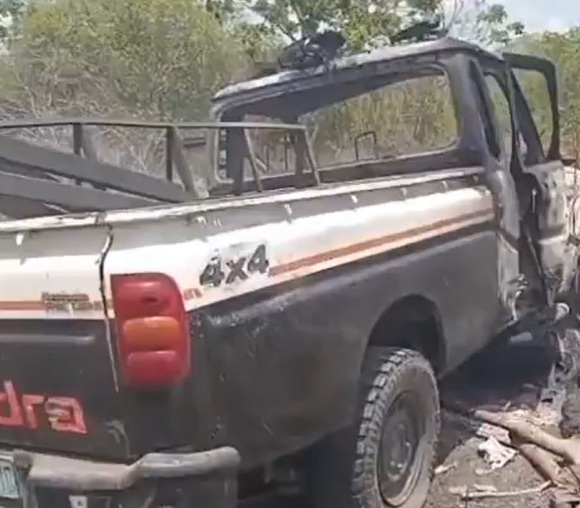Mozambique: Toll collection resumes without incidents, despite some queuing and honking
Mozambique: UIR officers reportedly killed in Cabo Delgado ambush

Screengrab: Cabo Delgado /X
At least four officers from the Rapid Intervention Unit (UIR) of the Police of the Republic of Mozambique died in an attack by alleged terrorists on a convoy on National Road 380, Cabo Delgado, an official source told Lusa on Wednesday.
According to the source, the UIR agents were caught on Tuesday in an alleged ambush by rebels on the stretch between Chitunda and Xitaxi, Muidumbe district, at around 09:00 (08:00 Lisbon time), when they were escorting motorists on their way from Awasse, Mocímboa da Praia to Macomia, in the centre of Cabo Delgado.
“It was a very difficult day for the force in Cabo Delgado and all of it in general, they killed four colleagues and burnt the vehicle,” said the source from Pemba, adding that the escorted vehicles were not damaged, but were forced to stop on the road until a military force arrived to help.
“The civilians were not attacked; it was our force that was targeted,” said the same source.
These escorts on the road were resumed in July, at the request of local people and businesspeople, following the upsurge in terrorist attacks in the area.
Recently, there have been numerous insurgent attacks in Mocimboa, Montepuez, Metuge, Macomia, Muidumbe, …
Yesterday morning, a UIR force escorting vehicles on the Awasse-Macomia road was ambushed on the Xitaxi-Chitunda road in Muidumbe. Four UIR agents were killed in the attack pic.twitter.com/DQTSeM8D5G— Cabo Delgado (@DelgadoCabo) October 22, 2025
The gas-rich province of Cabo Delgado in northern Mozambique has been the target of extremist attacks for eight years, with the first attack recorded on 5 October 2017 in the district of Mocímboa da Praia.
The UN estimated on Tuesday that at least 44 people died and another 208,000 were affected in August by attacks by extremist groups in Cabo Delgado, a Mozambican province that has been facing an armed insurgency for eight years.
According to a field report by the United Nations Office for the Coordination of Humanitarian Affairs (OCHA), up to August, Mozambique also reported a total of 111,393 displaced people, the majority from Cabo Delgado (109,118), although movements of people were recorded in the provinces of Niassa and Nampula.
“Civilians continue to face serious security and protection risks, including kidnappings, looting and threats,” the document states, adding that these incidents in August “resulted in 44 deaths and 101 kidnappings, including six children and five women”.
In addition, insecurity, combined with “significant” reductions in humanitarian funding, has “severely limited” the ability of partners to reach affected populations.
“Violence against civilians, military operations, sightings of non-state armed groups and rumours of kidnappings and ransom demands have made access unpredictable in the districts with the most serious needs and incidents,” the report says, adding that the situation resulted in the temporary suspension of humanitarian missions in rural areas of the districts of Macomia, Quissanga, Muidumbe, Mocímboa da Praia, Meluco and Metuge at the beginning of August.
According to OCHA, in August, funding for organisations on the ground was half of what was available in the same period last year, reducing the humanitarian presence and limiting the capacity of partners to adapt to a dynamic operational context or to broaden responses to the emerging needs of the approximately 208,000 people affected by the conflict.
Almost 93,000 people have fled Cabo Delgado and Nampula since the end of September due to the upsurge in attacks in northern Mozambique, doubling the number of displaced people in just a few days, according to previous data from the International Organisation for Migration (IOM).
On 6 October, the President of Mozambique, Daniel Chapo, called the attacks in Cabo Delgado “barbaric acts” and against “human dignity”.
The Armed Conflict Location and Event Data Project (ACLED) counts 6,257 dead after eight years of attacks in Cabo Delgado, warning of the current instability.












Leave a Reply
Be the First to Comment!
You must be logged in to post a comment.
You must be logged in to post a comment.